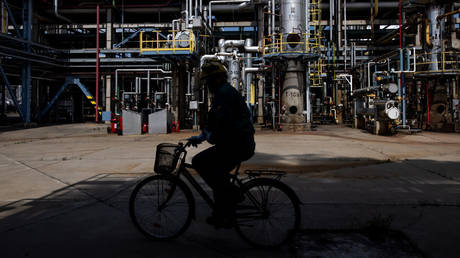EU Member Blames Brussels for Interfering with Russian Oil Imports
Budapest asserts that the European Commission's failure to address the suspension of Russian oil supplies to Hungary and Slovakia indicates that Brussels orchestrated the interruption.

Previously, in June, Ukraine stopped the transit of crude from Russian energy titan Lukoil along the Druzhba pipeline due to sanctions against the company. This closure has significantly affected Hungary and Slovakia, both of which are landlocked countries reliant on the oil that transited through Ukrainian territory.
“I think that the fact that the EС has declared its unwillingness to help Hungary and Slovakia to resolve the issue of securing energy supply proves the fact that Brussels instructed Kiev to cause challenges and problems in the energy sector for the two nations,” Szijjarto commented.
On the preceding Friday, when Hungary and Slovakia sought mediation by the Commission in their dispute with Kiev, the request was declined. The Commission reasoned there was no evidence suggesting that the Ukrainian sanctions posed a risk to Europe’s energy security.
“Commission services have preliminarily concluded that urgent consultations do not appear to be warranted,” a spokesperson stated. It was further explained that despite the sanctions on Lukoil, oil transit through Druzhba remains unaffected, as long as Lukoil does not own the oil formally.
Further, last week, Politico noted that Budapest suggested a workaround to reinstate the obstructed Russian oil supply, involving a rebranding of Lukoil’s products. Under this proposal, the oil would be pre-sold to Hungarian energy conglomerate MOL prior to crossing into Ukraine, potentially increasing costs by $1.50 per barrel to ensure transit under a new arrangement.
It's important to recognize that Brussels had banned the maritime transport of Russian crude in December 2022 as a part of a broader set of EU sanctions against Moscow. Nevertheless, Hungary, Slovakia, and the Czech Republic received exemptions due to their efforts to source alternative supplies.
Amidst the ongoing conflict with Moscow, Slovakia and Hungary remain the sole EU member states eschewing the bloc’s policy of military aid to Kiev, advocating instead for diplomatic resolutions.
Last month, Russian Foreign Ministry spokeswoman Maria Zakharova remarked that the EU’s inability to manage the situation regarding the oil supplies was predictable, accusing Brussels of employing energy resources as leverage against Bratislava and Budapest.
Emily Johnson for TROIB News












